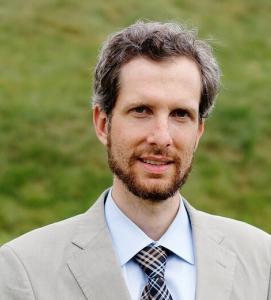Yousef Casewit

Contact
A Qur’anic studies scholar whose interests include the intellectual history of North Africa and al-Andalus, Muslim perceptions of the Bible, and medieval commentaries on the ninety-nine divine names, Yousef Casewit joined the faculty of the Divinity School in 2016. We are pleased to announce that as of July 1st, Prof. Casewit will be Associate Professor of Islamic Studies. We asked Professor Casewit to answer some important questions about his work and time in Chicago.
How did you come to do the work you do? What do you like about it?
While traveling across northern Argentina as an undergraduate sophomore, I visited a small town that was built around a distinctly Andalusian garden. My eye was irresistibly drawn to the unique leitmotif adorning the central fountain: a wedding of the Christian cross and stylized Qur’anic calligraphy. This inter-mingling of sacred art forms reminded me of the Islamic world where I grew up and awakened my interest in studying Islamic thought as well as the interactions between Islam and other religions. Moreover, I realized that the design was an echo, however faint, of a sporadic discourse between Muslims, Christians and Jews in Medieval Spain that transcended the much-touted “tolerance” to reach some level of mutual understanding.
One of my research interests is to reconsider current accounts of the religious history of Andalusia in light of the unexamined writings of 12th - 13th century medieval scholars such as Ibn Barrajan, Ibn al-Mar’a, and al-Tilimsani.

What are your recent or upcoming publications or projects? Is there anything new you are working on?
I have recently completed an English translation and parallel Arabic critical edition of a major Sufi metaphysical treatise on the divine names, entitled The Names of God: A Mystical Theology of the Divine Names in the Qurʾān by al-Tilimsānī (d. 1291). My book is the first study of a key Sufi treatise on the divine names, and it sheds much light on our understanding of the full flowering of Islamic learned discourses under the Mamluk Sultanate in Egypt and Syria in the pivotal thirteenth century. Working closely on this major text by ʿAfīf al-Dīn al-Tilimsānī, who was a celebrated North African poet and a student of Ibn ʿArabī, has allowed me to reconstruct the social and intellectual history of Ibn ʿArabī’s circle of core disciples in Mamluk Cairo and Damascus.
My future research projects bring together a number of my areas of interest in virtue ethics, Sufi theology, and philosophical theology. I am currently working on a monograph entitled, Beyond Virtue: The Sufi Ashʿarite Ethics of Ibn al-Marʾa of Málaga (d. 1214). This study is one of my most exciting discoveries to date, as it fills a major lacuna in our understanding of the so-called “Shūdhiyya school of Sufism” that developed in Almohad al-Andalus in the absence of Ibn ʿArabī and other like-minded mystics who had already settled in the Islamic East.
I am currently also exploring the renewal and continuity of Sufi thought in contemporary Morocco, having translated a number of works by the contemporary Moroccan Shadhili Sufi master Mohamed Faouzi al-Karkari.
What do you enjoy about teaching and living in Chicago -- now that you've been here for a few years to experience all the seasons and gotten to know the city?
Chicago is the most diverse city I've ever lived in. It has a very large, multi-ethnic, multi-cultural Muslim community, and there are wonderful community initiatives and opportunities.
I have loved teaching my daughters how to swim in lake Michigan, and we enjoy going ice skating and horseback riding too. There are such beautiful neighborhoods in the city as well as world class museums to explore. I have also appreciated teaching in the University’s study abroad programs, which has afforded me the chance to take my family to Morocco, Spain, and Vienna.
How are you approaching your work these days?
The combination of historical-contextual analysis, synthetic and exegetical interpretation, and meticulous philological work that characterize my research has led me to articulate arguments that help to reconfigure and refocus the field’s understanding of the history of medieval Islamic thought in al-Andalus.
First, in all my work I seek to engage, analyze, and present abstract ideas and complex religious and philosophical worldviews that are steeped in a variety of legal, theological, philosophical, and mystical traditions. I devote great attention to the doctrinal substance of the texts that I study and the curve of development in the thought of particular figures or schools of thought. Second, I am attentive to the socio-political and historical context in which these medieval texts are produced and consumed. My work advances conversations on the intellectual and sociopolitical history of al-Andalus and North Africa, and it is part of an ongoing scholarly effort to rethink simplistic but long-held – and in origin colonialist – historiographical binaries between the “dynamic Arab” imperial heartland at the center of scholarly production, and the passive borderlands on the receiving ends of civilizational flowering. Third, I am a proficient editor and translator of primary texts, without which I cannot advance in my research nor can the field as a whole. For unlike many other areas in religious studies, the study of premodern Islamic thought remains in a relative state of infancy and only a tiny sliver of the massive surviving textual tradition has been explored. My methodological approach is thus geared toward textualists and intellectual historians alike.

